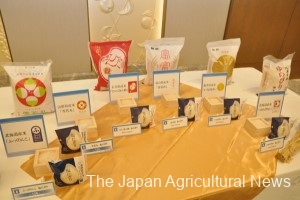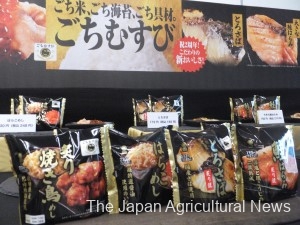TOKYO, Sept. 21 – Convenience stores in Japan are introducing high-priced onigiri rice balls featuring carefully-selected brand rice and domestic agricultural and livestock products. Thanks to the rising need for a modest luxury among people enduring the COVID-19 pandemic, household spending is increasing. Agricultural and livestock producers hope that such rice balls that you can easily buy at nearby stores will be an excellent promotion to increase the consumption of their products.
According to a family budget survey by the Ministry of Internal Affairs and Communications of Japan, annual spending on rice balls per household with two or more people was 4,746 yen in 2021, up 5% from the previous year. Despite the decreased spending on polished rice, the upward trend continues to mark a 29% increase from 10 years ago. It’s likely owing to the growing need for easy meals and active product development.
-Using brand rice only
Lawson’s onigiri featuring brand rice
Lawson began to sell rice balls made with a single brand of rice nationwide in July. Currently, it sells two types of onigiri using Yukiwakamaru-brand rice from Yamagata Prefecture. They will be followed by onigiri made with Hyakumankoku-brand rice from Ishikawa Prefecture, Fufufu-brand rice from Toyama, Ichihomare-brand rice from Fukui, and Yumepirika-brand rice from Hokkaido. It’s unusual for a convenience store to continue selling rice balls made with only one brand rice nationwide. “We’d like people all over Japan to know about them, support the demand, and learn a lot more about rice again,” said Sadanobu Takemasu, president of Lawson.
-100% Koshihikari combined with carefully selected ingre dients
On September 13th, FamilyMart introduced a new line of products, the “Gochi Musubi” high-end rice ball series. They are made with 100% Koshihikari-brand rice. Also, the company paid great attention to how to cook rice and what ingredients it should choose. “Broiled Hinai Chicken Yakitori Rice” (220 yen) uses Hinai-brand chicken raised by a member of a primary agricultural cooperative (JA) in Akita Prefecture. The National Federation of Agricultural Cooperative Associations (Zen-Noh) supported the supply of the locally raised chicken. The number of Hinai chicken producers and the demand for the chicken are declining due to the pandemic, so, Zen-Noh “wants to support the producers by supporting the products,” according to the sales development department of the federation.
For FamilyMart, the sales of high-priced rice balls accounted for 25% of the company’s overall onigiri sales in 2022, up 12 percentage points from 2020. As the demand for products and services for improve home experience expands, there seems to be a need for something to enhance what’s on a regular dining table.
-Showing rice brand on packages
Seven-Eleven sells high-priced onigiri stuffed with grilled salmon belly (grilled salmon harasu in Japanese) featuring brand rice at around 194 yen. It uses Tsuyahime-brand rice from Yamagata, Koshihikari-brand rice from Uonuma, Niigata, and Ginga-no-Shizuku-brand rice from Niigata. These rice brands are printed on the packages. “The pandemic changed consumer behavior, and more customers today pay attention to quality,” the company explained.



